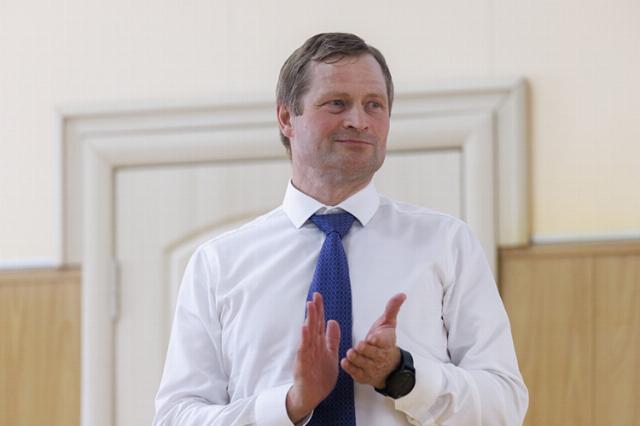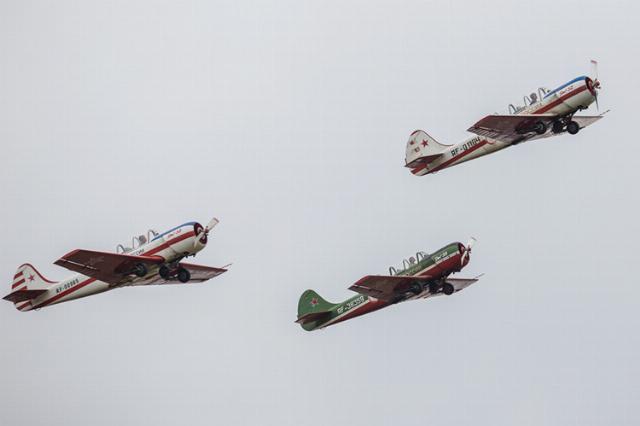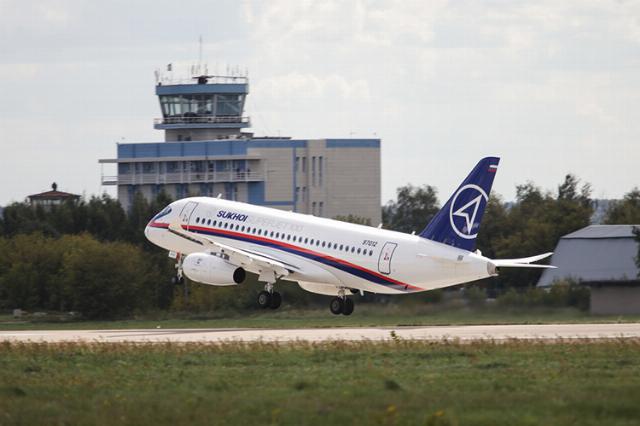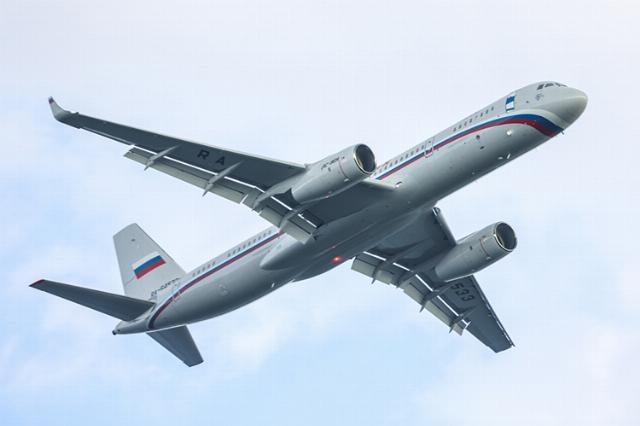The head of Tupolev shared with the students of KNITU-KAI his opinion on what is happening in the aviation industry
The information leaking out about the progress of the Tu-214 program is not very encouraging. Konstantin Timofeev, Managing Director of Tupolev, tried to present a counterweight to it in Kazan. At the end of last week, he spoke to the students of KNITU-KAI — his potential employees. The correspondent of BUSINESS Online found out how many Tu-214s are in operation, how far the import substitution of the liner's systems has progressed, whether new workshops are being built on KAZ and what about PAK DA.
 |
| Konstantin Timofeev. |
| Source: Sergey Elagin / www.business-gazeta.ru |
Konstantin Timofeev had the opportunity to present himself to the public in a more relaxed atmosphere — at a meeting with students of KNITU-KAI, which preceded the meeting of the Board of Trustees of the university
What can KNITU-KAI learn from Rashid Nizamov
Kazanets Konstantin Timofeev as the new managing director of Tupolev (appointed on January 16) and the first deputy general director of UAC (took office on October 18, 2023) is still "Mr. X of the aviation industry". To this day, he has appeared in public in these qualities only once — in February, during a visit to the Kazan Aircraft Factory, a branch of Tupolev (KAZ) of Russian President Vladimir Putin. But then the newly minted director was nothing more than a statistician. The other day, he had the opportunity to present himself to the public in a more relaxed atmosphere — at a meeting with students of KNITU-KAI, which preceded a meeting of the university's board of Trustees.
The biography of the financier and pilot Timofeev is quite well known, but additional details were clarified at the meeting. It turns out that he also graduated from sports school No. 7 in Kazan, a candidate for master of sports in cross-country skiing. I studied in an aircraft modeling club, I wanted to go to KAI, but in the end I chose KFEI. He explained this by the fact that he was attracted to a strong programming school at the financial institute: "They showed me IBM-386 there. Most likely, this computer decided everything — I did not see this in KAI."
This excursion into the past fits well into the topical logic of the meeting. Two years ago, at the aviation and space forum in Kazan, associate professor of KNRTU-KAI Igor Fedorov, during an acute controversy with production workers about personnel training, reproached KAZ: "In order to attract schoolchildren to the university, it is necessary to make them want to study there. KAI is equipped with aggregates, a couple of helicopters and posters based on the design of the 60s. The student does not see anything new, but only the old. Maybe the plant should somehow turn its face to KAI?! Today, all the units were presented to me by my graduates, but the company does not give anything, only organizes some presentations."
When it was time for questions from the audience, Vladimir Gainutdinov, head of the Department of Aircraft Design and Engineering, who is also known at KNITU-KAI for his independent views on education, far from the approved mainstream, spoke about the responsibility of Tupolev and KAZ for training their potential employees. According to him, employers regularly blame the university for the quality of graduates, but the aviation industry itself does nothing to correct the situation. In addition, it is aggravated by some peculiarities of the approach to education. First of all, we are talking about the principle of per capita financing, because of which it is unprofitable for the university to expel the underachievers, as well as (which, in fact, is the same thing) about "the indicator that the rector reports on - the safety of the contingent." At this point, the rector of KNTU-KAI Timur Alibayev began to show signs of concern: public discussion of such things is an unspoken taboo.
— All this is not very correlated with an increase in the quality of training, — said Gainutdinov. — Why am I talking about this? Recently, with colleagues from China, we visited KGASU. It's just amazing! A European-type university. We ask: "Where does this come from? And this? And that one?"—"Those are our employers who did their best. And those are the others." "How did you manage to do that?" — "Well..." I understand that Nizamov has not only a kind word in stock, but also a colt, however... Today the board of trustees, employers will be there, maybe we can discuss this problem? I'm not talking about giving us money — there are many ways to mutually beneficial cooperation. Maybe even invite Nizamov to share his experience.
— What's the question? Timofeev tried to clarify.
— This is not a question, but a request: to raise this issue at the Board of Trustees. If an employer wants specialists to be trained more efficiently, he must participate in the process.
— Is it a request to participate even more?
— No, not "more". Just to participate," the professor calmly replied, transparently hinting that the interaction between KNITU-KAI and Tupolev still mostly remains at the level of declarations. For example, the basic department of the university at KAZ, which is now and then mentioned as a huge achievement, has not progressed beyond its rudimentary state.
For obvious reasons, Timofeev did not manage to say anything specific in response - he has been in office recently, but we hope that thoughts have appeared for the future.
 |
| Yak-52. |
| Source: Sergey Elagin / www.business-gazeta.ru |
"The main thing is to love your job. To love the sky. If there is an opportunity, you need to jump with a parachute, fly on an airplane — and everything will come"
Why do students need to fly
But in general, the speech of the head of Tupolev was quite informative, although, limited by an hour of time, he was forced to jump from topic to topic: engines, airframe design, flight profile, fuel consumption, airport operation, avionics, aerodynamics. And the ideology of the aircraft industry. After yesterday's meeting, there was some idea of how the head of Tu sees his company and the aviation industry as a whole. Previous directors of the company did not consider it necessary to give out such information. Plus Timofeev. A few theses.
How flight automation changes the essence of a civil aviation pilot: "I am now trying to use modern terms: not "pilot", not "pilot", but "operator" — so in my understanding." Many distinguished pilots speak about today's emasculation of the profession. Timofeev did not specify whether this was a good thing, but an evaluation point was made later when he was asked what qualities he would like to see in graduates of KNITU-KAI: "I could say: dedication, discipline, control over working time, but all this is secondary. The main thing is to love your job. To love the sky. If possible, you need to jump with a parachute, fly on an airplane — and everything will come. It's such a contagion... good… You can go to Kurkachi, there is a Yak-52 there, something else." Here Timofeev touched KNITU-KAI's phantom pain. Many people remember that once the university had its own design bureau, the guys designed, built airplanes with their own hands and flew them. And KAI thundered throughout the Soviet Union and regularly supplied graduates to the Kazan Aircraft Factory. Who better than "Tupolev" to think about this pattern.
By the way, KAZ also had his own aero club, the Yak-18 and L-29, which the workers flew, are probably still somewhere at the factory. This is about the issue of attracting young people: do not think that money alone solves everything.
About current and Soviet engineers: "What are we facing today? The designer made the product and put it on the stand. It should break when overloaded at 10g, but it only breaks at 20. Is the designer well done or not? Probably not very much — I added double the weight." "Today, about 100 Tu-134s are still flying. The most reliable aircraft! He asked, "How long will it take to fly?"40-50 years — exactly." The domestic aircraft industry was focused on reliability. On the other hand, there is excess weight behind this reliability. Therefore, when asked if the Tu-214 has reserves, I answer: "Of course." Its maximum take—off weight is 110 tons, and 3-4 can definitely be removed."
About the fashion for composites and "ideal" technologies: "Metal aircraft or composite? It is very difficult to understand the resource of composite products. So far, there are no technologies that allow us to confirm whether there is destruction or not, and at the micro level (here, in his words, I heard the greeting of the MS-21 with its black wing — ed.). If you figure out how to do this, it will be a big breakthrough… There is no such thing as just a composite. Boeing still makes a metal wing: the riveting is perfect (we also strive for this); the wing surfaces are in perfect contact — they are placed almost without gaps, including front and rear mechanization. And the perfect paint. We painted imported, and now — Yaroslavl. It is slightly heavier, and the application process is 3 times longer. This is also a reserve for reducing labor intensity. Why am I leaning on her? To make the Tu-214, 800 thousand standard hours are needed, our task is to decrease to at least 600 thousand. This is an improvement in technology and manufacturing process. In general, the improvement of the product itself. The fuselage should be perfectly flat. But we need the quality of the metal. We want to work on this first of all."
 |
| Superjet. |
| Source: Sergey Elagin / www.business-gazeta.ru |
"It is very useful to put the Superjet and the Tu-214 side by side, to compare the quality of steel, electrics, the fuselage itself..."
About Superjet: "I came across him directly (Timofeev has a Superjet pilot's certificate — ed.) and I still fly sometimes. What's the plus? He brought to our industry and design the advanced ideas that the Italians, the British, and the French had. It is very useful to put the Superjet and the Tu-214 side by side, to compare the quality of steel, electrics, and the fuselage itself… We need to do not so much even domestic, as in maximum cooperation with countries with which there are still economic ties." Timofeev did not talk about the disadvantages of the Superjet program.
Along the way, Timofeev gave out very interesting information about how things are going with the PD-8 engine for the Superjet (which is now called SSJ-New): "We hoped that it would be in December 2023. Everything is great at the stand. They put it on a flying laboratory, it was fine for a while, and then processes began that could not have been foreseen on the stand. We are urgently working on it now."
Of those who asked questions, Timofeev was pretty surprised by second-year student Ilya Sokol. "What is your opinion about the viability of the engine layout in the rear fuselage, in particular in terms of working from unprepared airfields? — the guy asked (the question is given in an abbreviated version). — And how much will it simplify maintenance, even by reducing the degree of double-circuit?"
"Wow, what an advanced one,— Timofeev rejoiced. — I will try not to offend anyone. Is Uaz a good car? It's great — it can go anywhere. But the whole world does not ride them — for some reason they made a Landcruiser and drive on asphalt. Infrastructure is very important." According to the head of Tu, the global trend is a good streak. The world is moving towards artificial turf. And unpaved lanes are for local, not mainline aircraft. In very hard—to-reach places, a helicopter is needed at all - this will be more effective than experimenting with the operation of aircraft in extreme conditions.
 |
| Tu-214. |
| Source: Alexey Belkin / www.business-gazeta.ru |
About the number of Tu-214 in operation: "Now we have 12 aircraft in varying degrees of readiness"
About Tu-214 — with notes of pride and optimism
It was expected with particular interest that Timofeev would talk about the progress of the Tu-214 program and the state of KAZ. And something new sounded.
About the adjacent parts: "With what tolerances should the workpiece be made? There is a lot of marriage in the adjacent areas. To maintain the dimensions, we have to buy parts with a margin for them. We process them from two sides, turn them over. This is a huge amount of work. There are huge reserves [for improvements]."
About composites in the Tu-214 design: "There is a breakthrough in composite production, but this is mainly Rosatom. He makes two types of materials, and we will use them: we will agree and, I think, we will do it for reasonable money. And we will involve colleagues from KAI in the work on composite technologies."
About the PS-90 engine: "The improvement will be within the framework of improving noise characteristics and thrust: maybe we will add 500 kilograms."
On import substitution: "Which systems are we definitely changing? Calculators: they were imported, now they are ours. Not from a good life — there are simply no others. We are making our near-earth and mid-air collision alarm systems, our radars. We will improve the lighting and electrical equipment, the hydraulic system, and the aircraft control system. We have already done them, now we just need to test them. There are 15 such systems in total, and about 30 secondary ones. We are also working on them."
On whether the Tu-214 will be in-line production: "The conveyor line is planned, it has been contracted. The goal is to produce 20 aircraft per year. We don't need any more, we'll see about that later — anything is possible."
About the number of Tu-214s in operation: "Now we have 12 aircraft in varying degrees of readiness."
About what will happen to Tupolev after the Tu-214: "Right now we need to think about an airplane that doesn't exist yet. From idea to implementation — 12-15 years. There should be several stages of improvement before the idea — the model range, technical processes… It is important to lay down a vision of the aircraft of the future, because if you take the engines, then we have a very small bench of spare parts — PD-8, PD-14, PD-35 on the horizon. And if you look at foreign engines, there is a line of 20 tonnage dimensions and another plus is four different manufacturers."
About PAK DA (in response to a question from the audience): "Open the Internet and watch. Everything is written correctly there. We're doing it slowly. Do you need it? Of course you do."
About the Tu-324-based business jet : "Now Gazprom has a structure that designs a business jet, makes the first attempts."
At the end, Ravil Zaripov, Assistant to the President of Tatarstan for the airline complex, took the floor. He stressed that the republic will continue to take all possible measures to create conditions for the development of the aircraft industry. "The aircraft factory has a huge future," he is sure. — Yes, the process is not easy. Yes, 15-20 years have been disastrous for aircraft factories. We have lost this period, now we need to catch up, and in aviation, not everything is so fast. According to KAZ, I report: financing has been opened today; an excellent assembly plant is being equipped — a production line; this year we will complete construction and equip a machining workshop — more than 120 modern machines."
Zaripov assured the students that they have every opportunity to move further in their profession, and summed up: "Congratulations on choosing an aviation theme, I hope you have a sense of pride and optimism."
Timur Latypov

